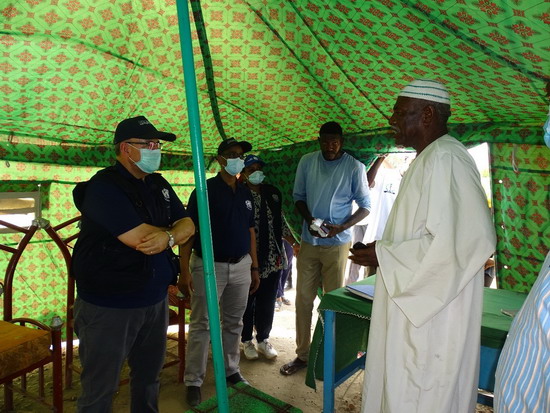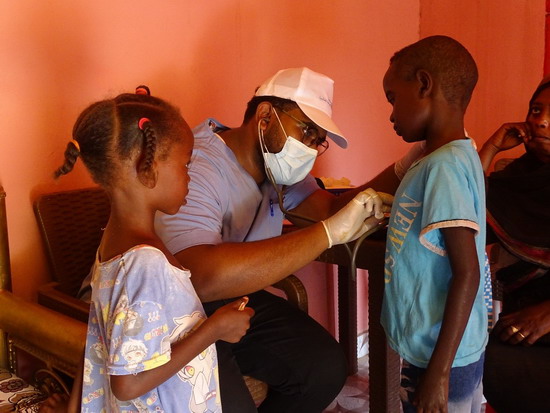 WHO Representative to Sudan during his visit to the camp.
WHO Representative to Sudan during his visit to the camp.
10 October 2020 - In an effort to respond to the heavy rains and floods that have provoked considerable damage in Khartoum, WHO supported the State Ministry of Health in Khartoum to set up a clinic in Shigelab Jebel Awlia, one of the most affected areas in Khartoum where many of its residents have lost their homes and have seen their health deteriorate due to the difficult living conditions.
As a result, many people have become internally displaced and are living in camps, mainly Alkhour Camp which has been established in response to these floods. Alkhour camp hosts an estimated 1300 people including 55 children under the age of five and 31 pregnant women.
This year, heavy rains caused the worst floods in Sudan in decades. More than 860 000 people have been critically affected and more than 120 persons have died, with Khartoum being one of the most affected states in the country.
With heavy rains, come heavy health consequences as the rains and floods increase the likelihood of outbreaks of vector-borne diseases such as malaria, dengue and chikungunya fever. Internally displaced people also suffer from lack of access to clean water which can increase the likelihood of exposure to diseases such as diarrhoea, cholera, dysentery, and typhoid.
“After visiting the area of Shigilab and assessing the situation, and identifying the number of internally displaced and affected people, we have decided to opt for a more sustainable and long term solution and have decided to establish a fixed clinic within the area that is easily accessible to our target population. We have also mobilized local people from the community to work with us as a way to make contact with the local population. Having a fixed clinic for a period of one month will also help us identify existing diseases and outbreaks and better assess the health situation in the area,” said Suhaila from the Emergency and Humanitarian Assistance Directorate at the State Ministry of Health in Khartoum.
 A volunteer doctor doing a check up for a child from the camp
A volunteer doctor doing a check up for a child from the camp
To respond to these emergencies WHO is supporting the State Ministry of health in running a clinic near Alkhour camp to provide medical services serving everyone in the camp and surrounding areas. A group of volunteers have been mobilized, composed of doctors and nurses, to offer basic and emergency health services. Not only limited to emergency cases, these services also target people with chronic diseases and routine checkups.
"Here at the clinic, we do our best to provide the maximum care within our capacities. Our main focus is children, mothers and people with chronic diseases as well as emergency situations, in addition to regular routine checkups. We also make sure to follow up with each patient and refer them to the most suitable care centre or hospital should they need further procedures outside our capacity at the clinic. Our job, however, does not stop at providing the needed medical care, as we are also working to mobilize further volunteers to work with these people on community engagement and to raise awareness on preventive measures to protect health. We would like to ensure sustainability and develop people’s autonomy in adopting healthier habits such as personal hygiene, homemade oral rehydration solution, safe cooking, etc.," said Mohamed Al Mujtaba, one of the medical volunteers who offers his time and efforts to help the affected population.


